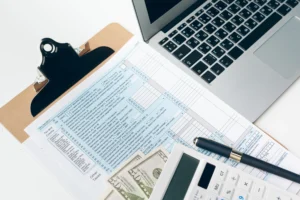Experts have estimated that over 40% of American businesses are considered to be exposed to a high level of risk from COVID-19. This includes businesses that have closed temporarily due to lockdown measures, as well as those whose operations will be threatened by a loss of confidence in the market going forward.
If you’re planning to reopen the doors of your business in the coming weeks, you’ll have a number of important things to consider. Potential tax breaks are one of these.
Read on as we look at seven key things you should ask your tax accountant when reopening your business.
1. Should I Revise My Approach to Employee Healthcare?
At this time, employee healthcare is a hot-button issue. Many workers may be relying on healthcare schemes if they contract the COVID-19 virus, or if a pre-existing condition (such as chronic anxiety) has flared up due to movement restrictions.
However, health insurance is also a major expense for employers. To make sure that you’ll be able to continue providing coverage for your workers, you should consult with your tax accountant to make the payment as tax-efficient as possible.
2. Am I Paying Unnecessary Distributions Taxes?
If you put spare cash into investment funds, you should take the time to consider the tax implications of the various options.
When you invest in a capital market instrument, your returns will come either in the form of dividends or capital gains. The distinction might mean little to you, but it can be very significant in terms of your tax obligations.
Mutual funds make capital gains distributions at the end of each calendar year. These represent the overall gains made by the funds in that twelve-month period.
These don’t necessarily translate to money in your pocket. However, the tax authorities will view them as if they do.
ETFs, which are similar to mutual funds in many ways, do not generally make capital gains distributions. This means that they may be more tax-efficient.
3. Are There Any Government Assistance Programs I Should Be Taking Advantage Of?
The COVID-19 pandemic has left countless businesses in dire straits. While the assistance package from the federal government has not been as generous as in many other countries, there are certain schemes in place that aim to lessen the pressure on businesses.
One such scheme is the SBA Disaster Loan Disbursement Program. This program offers business loans with favorable terms to enterprises that have suffered negative effects from a “declared disaster,” which is a status that the pandemic now holds.
There are also various grant and loan programs that are available all the time, outside of the situation with the pandemic.
Your tax accountant should be able to advise you on whether any of these schemes are likely to benefit the recovery of your business.
4. Am I Paying My Taxes at the Right Time?
Not every business owner knows this, but the rules on when you pay your taxes are not always strict. You can delay payment by investing in certain tax-deferred investment vehicles.
The most common examples of such vehicles are 401(k) plans and IRAs. These both relate to your personal income, rather than your business funds.
In a year when your liquidity levels are likely to drop as low as they ever will, this could be an invaluable lifeline. That said, you will have to pay your taxes eventually. Deferring them with no idea of how you’re going to pay them back in the future is a dangerous strategy.
5. Are There Any Regulatory Changes I Should Be Aware Of?
The tax landscape is notoriously complicated. Adding to this is the fact that the rules change frequently.
One of the most important roles of a tax accountant is to keep abreast of important changes. In reality, you shouldn’t have to ask your tax accountant this question; they should be coming to you with the answer before you even think of it.
6. Are There Any Changes I Can Make to Reduce My Tax Bill?
Everyone’s heard the old saying about death and taxes. However, while having to pay tax is an unavoidable certainty, there are steps you can take to lessen your tax burden.
You can generally achieve this by looking at your long-term strategy. Ask your tax accountant whether there are any steps you can take to reshape your business that would make it more tax-efficient and avoid paying unnecessary taxes.
7. Are You Doing All You Can?
There are good tax accountants, and then there are great tax accountants. One of the things that set the latter apart from the former is their willingness to go above and beyond the call of duty.
There are always improvements you can make to your preparation, documentation, and reporting processes. A good accountant will be able to direct you on these matters.
Don’t be afraid to ask questions like this of your tax accountant. This is a competitive business, so you shouldn’t be paying for a service unless you know you’re getting the value you won’t get elsewhere.
If the answer you get in response to this question is unsatisfactory, don’t hesitate to look elsewhere for your tax accountancy services. If you think your current tax accountant isn’t doing enough for you, we guarantee you’ll have a better experience with us.
Things You Can Ask Your Tax Accountant to Make Your Return to Business Easier
Tax is a highly complex area. The various allowances and obligations that apply to your business can be impossible to wrap your head around at times.
That’s why tax accountancy is such an important business. If you have any questions about your tax burden at this difficult time, don’t hesitate to ask your tax accountant.
If you’d like more detailed answers to the questions above, or you want to learn more about additional tax services we can offer your business, contact us today.
Call to Schedule a Free Consultation With an Indianapolis CPA Today
If you are the owner of a small business who wants to ensure that your business grows and succeeds, call to schedule a free consultation with an Indianapolis CPA as a CPA near me today. The experienced professionals at OnTarget CPA will evaluate your small business plan and help you identify its strengths and weaknesses. We serve the cities of Indianapolis, Carmel, Fishers, Noblesville, Westfield, Zionsville, Geist, Greenwood, Avon, Brownsburg, and surrounding communities. Check out our website at ontargetcpa.com or give us a call at 317-820-2000 and learn more about how a CPA near me who is an Indianapolis CPA can help you reach your business goals.






